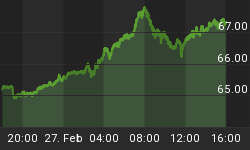Emerging Markets Have A Pulse
The best investments have positive technicals and positive fundamentals. How long the emerging trend in the China ETF (FXI) lasts will be highly dependent on the ongoing fundamental data coming from China. Reuters summarized where Chinese policymakers are hoping to take their economy:
The second stage of China's development promises to be no less momentous. Consumption will take over the growth baton from investment. Services will grow as a share of the economy, while industry shrinks. Commodity-intensive mass manufacturing based on cheap labor will give way to greener, cleaner ways of making things. More of the value added by a better-educated, more productive workforce harnessing new technologies will stay in China instead of going to multinational companies.

Our market model tracks over 130 exchange-traded funds allowing us to zero in on emerging trends. As noted on September 9, the model recently identified FXI using technical analysis. Asset prices are determined by the collective thoughts, research, opinions, and outlooks of all market participants from the smallest individual investor to the largest hedge fund. The aggregate stance toward China has been decidedly more bullish in recent weeks.

Market Share vs. Profit Margins

The NASDAQ 100 ETF (QQQ) was lagging early Wednesday afternoon in part due to concerns about Apple's pricing strategy for the recently announced iPhone 5. Apple chose to focus on margins rather than market share. Many Americans never pay sticker price for their phones, since cellular companies subsidize the phone purchase in exchange for a longer-term contract. That is not the case in China, where the MSRP matters. From Bloomberg:
Apple has lost ground to Samsung and other rivals which make cheaper smartphones based on Google's Android operating system. This is especially true in faster-growing emerging and developing countries such as China, Brazil and India, where consumers typically buy a phone without a contract and sign up to pre-paid monthly wireless plans.
That Was Then, This Is Now
The stock market can be cruel. Just when those who are underinvested begin to feel vindicated, the bull rights itself and stocks shoot higher. The S&P 500 looks quite different today than it did during the mid-to-late August correction (see below).

Syria Stays On Back Burner

Stock market bulls were able to keep Syria-related fears at bay again Wednesday on the heels of President Obama's televised remarks. From the Wall Street Journal:
President Barack Obama told Americans Tuesday he would pursue a newly energized diplomatic course to try to resolve the standoff with Syria, but he insisted that the U.S. must conduct military strikes, if needed, in response to the Assad regime's alleged use of chemical weapons. Mr. Obama said in a televised address that he asked Congress to postpone a vote on a resolution to authorize military force, which he looked likely to lose. Instead he said he would reserve the option of military strikes while pursuing a Russian proposal for Syria to hand over its chemical weapons under an international agreement.
Investment Implications
Better data from China and decreasing fears of military strikes in Syria have helped push the market's technical profile to bullish levels not seen since mid-August. If the bullish bias can continue, our disciplined rules will call for a third increase in our exposure to equities. The market's short-term outcomes may depend on what happens near the resistance cluster shown below.

If the S&P 500 can clear 1685, it could begin to fill the white space in the chart below. The market's recent reversal near the 100-day moving average (in blue below) is not atypical in a bull market.

With the widely anticipated Fed September announcement only five trading days away, we will take what the market gives us, but with a flexible and watchful eye.















